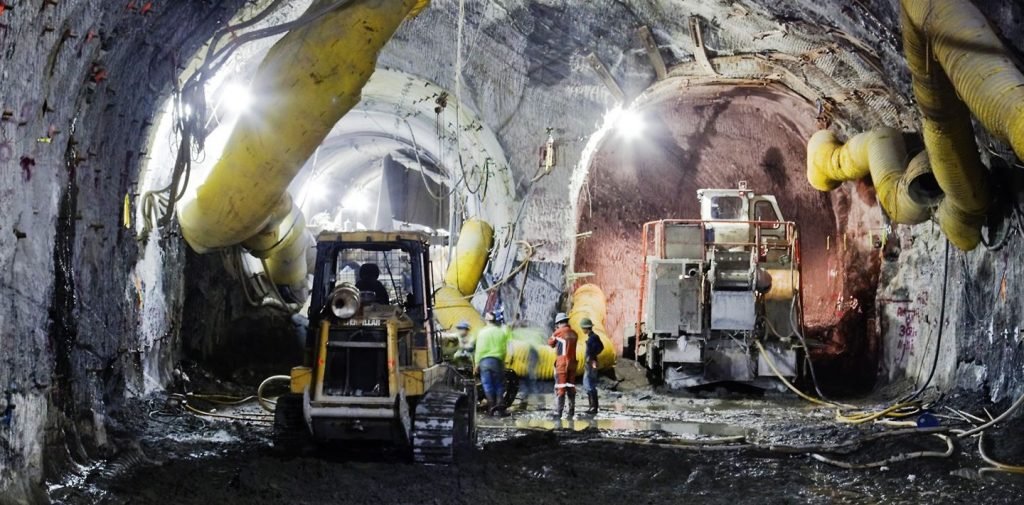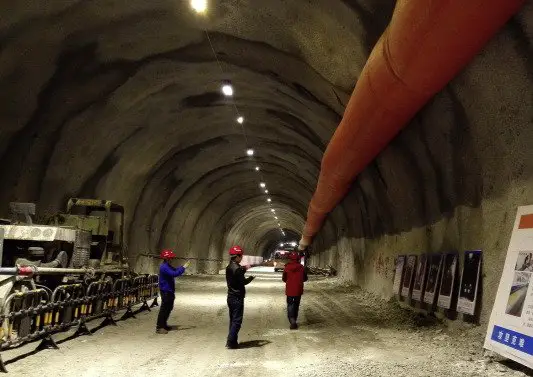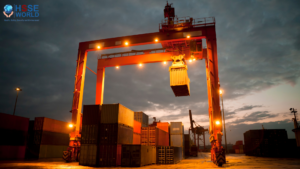Tunneling Safety
4 min readTunneling work is widely carried out in the construction of the railway, road projects, and irrigation This work is specialized and hazardous because of cramped working space wet and slippery flooring, artificial lighting. Usually characterized by inadequate, ventilation, obnoxious gases, unseen weaknesses of rock, handling of explosives, hauling muck, etc, leading to accidents. in this article, we will take about the Tunnels hazards and the control measures during working on tunnels and underground

HAZARDS IN TUNNELING AND UNDERGROUND WORKS
The hazards involved in tunneling and underground works arise due to the following operations:
- Drilling
- Explosives and blasting
- Mucking plant and equipment.
- Supporting the excavation
Drilling Operations:
- Drilling equipment has to be kept in good condition.
- Only wet drilling shall be permitted.
- Drill platforms shall be built and maintained to provide safe working conditions.
- The suitable railing around the top deck Drill platforms to provide.
- To make sure that there are no misfired charges, which the drill may strike drill, drilling shall not be resumed after blasts.
- Charging of drilled holes and drilling shall not be carried out simultaneously in the same area.
Explosives and blasting:
- All precautions are to be taken as specified in the Handling of Explosives.
Mucking plant and equipment:
- After blasting inside a tunnel or a shaft, the roof and walls of the tunnel and sides of the shaft should be inspected by a tunnel foreman.
- Scaling shall be performed only by the experienced crews under the direct supervision of a competent supervisor.
- Adequate support (rock bolts or timber or steel supports with proper lagging ) to be provided, if the structure of the rock is weak, poor, or structurally defective.
- The prolonged time interval between the two operations to be avoided as the risk of accidents increases with such delays.
Supporting the excavation:
- After the mucking operation is over, the profile of excavation should be examined by an experienced person who should decide whether the support in the form of rock bolts, steel ribs, or shot-concrete is required before any further operation is carried out.
- In the case of rock bolts, safety measures for drilling the holes should be observed before the bolts are fixed. The normal precautions for the erection of steelworks including those of welding should be taken in the case of steel ribs.
GENERAL SAFETY PRECAUTIONS IN TUNNELING:
- The guidance of a competent foreman is a must for all operations to be carried out inside the tunnel.
- Adequate ventilation is required to remove polluted air, gases, and smoke produced.

- Temperatures of not more than 40 C dry and 29 C wet at the workplace place to be ensured.
- The tests shall be carried out once after every blast or a major rock-fall or at least every 24 hours once.
- Tests of gases and for temperature measurements and ventilation measurements shall be recorded properly maintained.
- Adequate steps shall be taken to prevent the liberation, accumulation, and propagation of airborne dust.
- Periodical medical check-up of the workers at least once in three months to be done and recorded.
- An adequate supply of pure and hygienic air to be maintained.
- The volume of air required shall depend on the following:
- Length of heading
- Size of the tunnel.
- Type and amount of explosives used,
- Frequency of blasting, and
- Temperature and humidity.
- Electric power shall be used. Whenever diesel engines are used, they shall be provided with suitable filters, scrubbers, etc, to remove all carbon monoxide and oxides of nitrogen, etc. Petrol engines shall not be used.
- Rocker or cradle type dump cars shall be provided with a positive type lock to prevent accidental dumping in mucking yards.
- The trolley tracks to be laid with points, crossings, and junctions and also adequately maintained.
- Blocks or buffers shall be provided at end of each track.
- Trains shall be operated with care and at a speed under the control of the operator at all times.
- A man shall ride in the front equipped with a whistle and a flashlight for warning men along the track and for signaling the locomotive operator If the locomotive is pushing a string of cars.
- The headlight on each end and a whistle or horn with a tone of sufficient volume shall be provided for locomotives.
- The scaffolding supporting the pipe shall be designed to carry the pipe when filled with concrete plus 100 percent overload plus the estimated weight of the maximum number of workmen that may work on the pipes while the pump is operating. A factor safety of 4 shall then be used.
- The pipeline shall be anchored at all curves and near the end.
- A proper system of communication should be maintained.
- Adequate fire protection facility to be provided.
- Shelter places for workmen shall be provided at suitable intervals in long tunnels.



